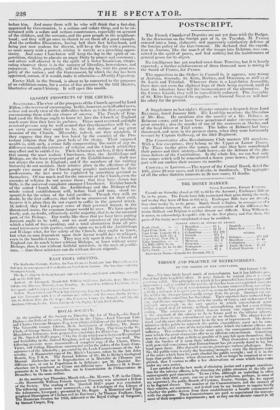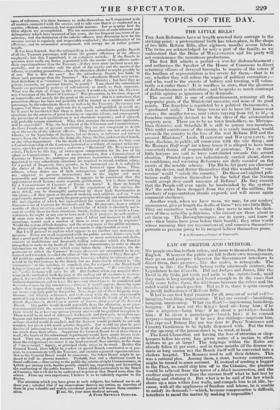THEORY AND PRACTICE OF RETRENCHMENT..
TO TUE EDITOR. 01 TUE SPECTATOR.
23rd January l32.
SIR—We have lately heerel much of retrenchment, but it has hitherto pro- dueed but little beneficial efr.er. It mar, indeed, be termed ahm.st a tar et prelerell 01Ji 1. The principles an whitly it has proceeded have been unjust and oppressive ;1 ts a relief to the pul ;LB that has been accomplished iliac, it, to very lif tle. The arm of ret rencliment lots become unnerved front ages of M- eet-iv it 7y ; and now it is agnin put in metian, SCCIIIS to have power only to crush it fir, wiml,t lit ..trongor in.:ects easily escape from its grasp. Amongst the un- tii:elings in tdi:ee semehing has been done. Their superiors have scattered beg- and disl res amongst them, widy the apathy of Stoics, and endeavoured to retrench unsparingly in the very quarter in which retrenchment must i"f1;et a great tical misery, without accomplishing any but a very frilling saving. 'The minimum at which human nature can support existence, is tin' standard of the salaries to be in future paid to the inferior officers. Amongst these classes, retrenchment can gil no further. The climax lots ar- rived, and the next alteration must be in the way of improvement. The deter- mination of the puldie to retrench the public expenditure, must net lie con- sidered as the and calico of the reductions under which the inferior officers are sulferizut.. This reduction is, for the most part, the consequence of the resist- ance which the great sinecutists offer to an efficient retrenchment. Something must be done ; and that as little as possible of it may fall upon themselves, they shift the burden of it upon their inferiors. They themselves are so fortified with powerful connexions that Retrenchment has yet scarcely dared to lay her hand upon them. ///es numerus,jancta,gue nmbone gialanges. But,. Sir, the public voice is every day becoming stronger ; every day dissipates menu of the mists which have for years clouded the public eyesight ; and it is in the hope that public abuses, when discovered, will no longer beconnived at or ae- glected, that I venture to offer a few observations on some which have come under my own notice.
lam satisfied that the best mode of obtaining justice and a proper considera- tion for the inferior officers, is by directing the public attention to the idle and extravagantly paid sinecmists. To me (who, although an underling in office with less than 2001. a year, can see as far into a millstone, perhaps, as some of my superiors), the public Boards of Customs Excise, Stamps, tcc. &c. appear
to be flagrant abuses. The number of the Customs, and the amount of their salaries, are enormous; and it shall now be my business to inquire briefly whether the public derives from these establishments a benefit commensurate with the expense. These Commissioners are paid to superintend the manage- ment of their respective departments ; and. as they are the cleraier rmort in all
cases of reference, it is their business to make themselves weN acquainted with all matters connected with the service, and to take care that it is conducted in a regular, efficient, economical, but respectable manner. Let us h:quire how far these objects are accomplished. The too numerous cases of emboadement and delinquency which have occurred of late years, the too frequent ins.s.onces of in- solvency, and the destitution of the inferior officers, may determine ht.nv far the revenue service is regularly and respectably conducted ; the consideration of its efficiency, and its economical arrangement, will occupy use at rather greater length.
ft has been boasted, that the relinquishing to the subordinate public Boards of all the Treasury patronage, will insure the greater efficiency of the officers employed ; but this, I apprehend, is an twegieus mistake. If the Boards in question were really any better acquainted with the merits of the officers under their superintendence than the Treasury—if they were more inclined to act im- partially, and to consider only the good of the service and the merits of the officers, in granting promotions,—then the alteration alluded to might possibly be of use. But is this the case ? Are the subordinate Boards less liable to abuse such patronage than the Treasury? The subordinate Boards may not in- deed distribute it as " retainers" in support of the Ministry ; but have they no private interests, no personal friends, to gratify? I ani a.fraid the subordinate Boards are governed by motives- of self-iuterest, as much as their supet hr. What was the state of things in this respect, I would ask, \awn Mr. FRE WIN was Chairman of the Board of Customs ? Was promotion, in his time, disposed of impartially, and merely for the good of tire service? But it is notorious' that promotion always has been and probably will be treated as a matter merely of patronage, by the subordinate Boards as well as by the Treasure. No vacancy can happen, but there are fifty applicants for it, equally vell qualified, or nearly o; fir It must be recollected that there is little room in subordinate Government situations for the exercise of great learning or superior talents, and consequently the possession of such qualifications is not absolutely requisite ; and if enjoyed,
probably remain unnoticed. Who, then, amongst the numerous appl lea nts,
will be successful? Why, the best friend of the Chairman and Commissioners. As these Boards are at present constituted, they are not competent to decide upon the merits of the inferior officers. They themselvCS are not selected for talents, er for knowledge of business, but are drawn, as influence :mil interest sways, from the Univers.ities, the Arniy,the Navy, the Bar, and even the Church, or any other department. On the death of a lamented statesman, we have seen a Commissionership of the Customs, bestowed as a tribute of respect to his me- mory, upon his private secretary ; and even a " Reverend" Mr. Be ell nu re- ceives, I believe to this day, an extravagant compensation fur the loss of his salary as Commissioner. I am not aware, moreover, that a Commissioner of Customs or Exciso, Se. undergoes inky previous instruction ; although officers sppointed to very subordinate situations are required to attend, without salary, fur a period of frequently three months, to be instructed (as it is called) in the duties of the situation which has been bestowed upon them. Thus, Officers, whose duties are of little consequence, and almost mechanical, are subjected to previous instruction; hut in the higher and most responsible and important situations, it appears to be considered that the appointment itself bestows every requisite qualification. Yet is there nothing for a Commissioner of Customs or Excise to learn? Is there no branch of knowledge essential for them ? If the regulations of the service, the inere detail, can be thoroughly understood by these high functionaries at one glance,—if they spurn at the idea of studying such subjects, and say "non tapit aquita museas; yet surely the great prineiples of foreign and intertial trade, the investigation of which has immortalized the names of ADAM SMITH (a Commissioner of Customs for Scotland) and Mr. Host; issoN, form a subject tvorthy of their attention, and ona a knowledge of which is absolutely neces- sary to qualify them for their situations. Surely, before any one is made a Com- missioner, he ought at any rate to have made a little progress in such studies ! If some care were taken to procure men of talent and business to till such situations, would such a number of them as exist at present be requisite ? Would the system of book-keeping. and the arrangement of the public accounts, be always undergoing alterations, and vet remain as objectionable as ever? But 1: will proceed to explain what" appears to me another very necessary al- teration. Every one at all acquainted with the public service, knows very well that a great part of the Inisines,-; which occupies so many secretaries and clerks, consists of multifitrions and frequently trilling references which the Board is compelled to make to the heads of the inferior departments, in order to obtain information on the sulects which ceme before thou. Fur instance, the de- partment to which the Customs' S izure AerOlintS are committed to be ex- amined and recorded, is called the office of "the Accountant of Petty Receipts." All petitions, applications, and references, however, relating to seizures, are re- ceived in the first instance by the Board, but are Mum:lintels- referred to " the accountant," or the solicito.r, or somebody else, for a repori,—the 13,;,:rd itself being as ignorant on the subject as the nom in the 1110011. "Ex moo diSrs MU- Will "—this instance will serve for all, lint further, when any materidl alter- ation in the method of book-keeping or the making out of nectionts is mmem- plated, it is usual for the Board to institute a committee of the heads of tl:o sub- ordinate department, and to leave the neeeary alterations to be consiolered and determine:I upon by this conanitree,—thes, as it would appear, fin owing upon others that responsibility and charge, ffir mole] taking which they theioseffies are 70 extnivagantly paid by the public. Niw, to get rid of these fi e vent, ttutt- blesome, mul -dilatory references, and to do away with the very objectionable mode of dcing linshless by deputy, I would sugges.t that the heads of the subor- dinate &plan:vas should, 05 0 matter Cl course, 1;Jrnt lit Mc Genera -Yourd. The public would benefit materially from the alteration' as 110 ques- tion connected with the service could then conic before the General Board, but there would be at least one person present who would be qualified to explain it. There would be no need of references backwards and forwards, to explain am- biguous and defective reports. The proceedings would be Lira veer, the expla- nations afforded would be explicit, and the decision xvould probably be not only sounder, but given with ninth greater despatch. icor would the plan be pro- ductive of ineouvenience in removing tie heads of the subordinate depal tments too much from their offices. Supposing the General Board to sit three times a week, the heads of the subordinate departments would have ample leisure to at- tend. They are, at present, numerous as the heads of the hydra ; and (to con- tinue the comparison) no sooner is one head removed, than another, in the shape of "an assistant," deputy. or principal clerk, arises in its stead. Besides this General Board, there mrgiit be a select or special Board, constituted as at pre- sent, to communicate with the Treasury, and exercise a general superintendence. But as the General Board would be numerous, the Select Board might be re- duced to half its present number. Probably four and a chairman would be found sufficient,—thus saving to the public the salaries of eight Commissioners, at LOGO!. per annum each, besides greatly simplifying, improving, and forwarding the conducting of the public business. I have alluded particularly to the Board of Customs, but wish not to be understood to point at that Board more than the others. From my own experience, I believe it to be infinitely superior to the
Excise. . .
The attention which you have given to such subjects, has induced me to ad- dress you; satisfied that if my observations deserve any notice, an insertion of them in your valuable and widely-circulated journal will insure them consider-
ation. I am, Sir, your most obedient servant,
A PCOR REVENUE OFFICER.



























 Previous page
Previous page